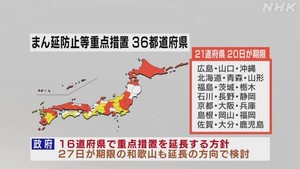News
Japan to Ease Entry Restrictions for Foreign Non-Tourists in March
posted on by Egan Loo & Alex Mateo
 Japanese Prime Minister Fumio Kishida announced on Thursday that Japan will begin easing its COVID-19 entry restrictions for foreign students and business travelers (if they have sponsors) next month. In addition, it will increase the number of people (Japanese and foreign nationals combined) who are allowed to enter from 3,500 to 5,000 daily, and shorten the COVID-19 quarantine period from seven to three days. Japan is still not allowing foreign tourists to enter until further notice.
Japanese Prime Minister Fumio Kishida announced on Thursday that Japan will begin easing its COVID-19 entry restrictions for foreign students and business travelers (if they have sponsors) next month. In addition, it will increase the number of people (Japanese and foreign nationals combined) who are allowed to enter from 3,500 to 5,000 daily, and shorten the COVID-19 quarantine period from seven to three days. Japan is still not allowing foreign tourists to enter until further notice.
Kishida also announced that 16 prefectures will extend their COVID-19 quasi-state of emergency to March 6, instead of ending it on Sunday as previously planned. The 16 prefectures are Hiroshima, Hokkaido, Aomori, Fukushima, Ibaraki, Tochigi, Ishikawa, Nagano, Shizuoka, Kyoto, Osaka, Hyogo, Okayama, Fukuoka, Saga, and Kagoshima. The prefectures requested extensions due to high hospital-bed occupancy rates. Wakayama prefecture is also considering an extension from its previously planned end date of February 27. The government will make a formal decision on Friday after receiving advice from experts.
Five other prefectures — Okinawa, Yamagata, Shimane, Yamaguchi, and Oita — will still end their quasi-state of emergency on Sunday as planned. 13 more prefectures — Tokyo, Saitama, Chiba, Kanagawa, Gunma, Kagawa, Aichi, Gifu, Mie, Niigata, Nagasaki, Kumamoto, and Miyazaki — already extended their quasi-state of emergency to March 6.
Japan reported over 95,000 COVID-19 cases on Thursday. In Tokyo, the occupancy rate of hospital beds is above 20%, which is the threshold the Tokyo government views as needed to ask the national government to implement a quasi-state of emergency.
While the government still has a ban on new foreign entrants in place until the end of February, the country allowed 87 foreign students to enter the country as a special case.
Previous quasi-states of emergency, which have less strict guidelines compared to a full state of emergency, have asked dining and drinking establishments to stop selling alcohol, limit their hours, and limit the number of customers. They have also offered some financial compensation to businesses that comply with the guidelines, and they imposed additional anti-virus measures.
Japan last ended a full state of emergency in 19 prefectures last September. That state of emergency started in July (although Okinawa had then already been under a state of emergency for four months).
Update: Japan confirmed on Friday that Wakayama will join 16 other prefectures in extending its COVID-19 quasi-state of emergency to March 6.
this article has been modified since it was originally posted; see change history